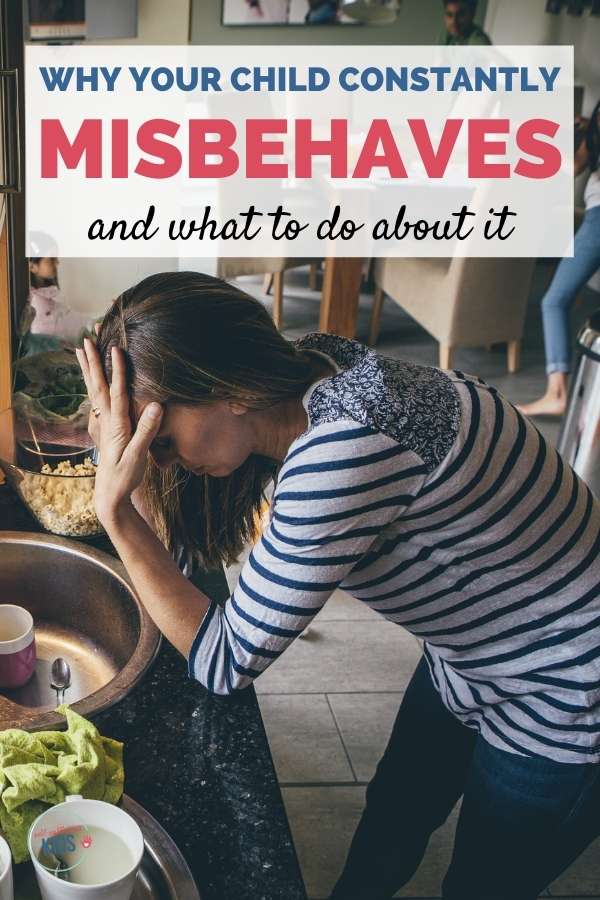Why Your Misbehaving Child Won’t Stop and What to Do About It
Misbehaving children can be baffling to parents. But understanding why your child misbehaves can lead to positive solutions to change the bad behavior for good.

Every evening it happens — the bedtime struggle.
“Time to put on your pajamas,” you say in as gentle a voice as possible.
“No!” your son exclaims while simultaneously running away.
“It’s time for bed, honey. You need your sleep.”
Back and forth the struggle continues until eventually, and much later than you’d like, your son finally climbs into bed and falls asleep.
Bedtime defiance is just one example of the many (aggravating) ways children misbehave. All parents have experienced some form of misbehavior from their kids at one time or another. Backtalk, tantrums, aggression, opposition or being intentionally irritating are just a few ways kids act out.
But here’s the thing:
While the causes of some kids’ misbehaviors are obvious – like when your child gets cranky because she didn’t get a good night’s sleep or dinnertime is later than usual – many can baffle parents.
Like the child who always finds a way to annoyingly interrupt his mother’s conversation at the playground, despite being instructed to wait for his turn to talk.
Or the three-year-old who keeps throwing LEGO bricks even after being told to stop and having been put in multiple timeouts.
Situations like these are frustrating, to say the least. And they leave most parents bewildered, not knowing why their children act the way they do or what to do to change the unpleasant behavior.

Why do children misbehave?
Understanding why our children misbehave is a crucial first step in determining how to stop it. Once we know why children act poorly, we can coach them to do better.
Often we’re conditioned to think of bad behavior as linked to personality. We assume some kids are defiant and others are aggressive, and some children are intentionally annoying to get attention.
Children’s personalities are different, so in some respects these assumptions might be true. However, if we look beneath the surface of our child’s behavior, we’ll likely find a deeper reason why they’re misbehaving.
The outward appearance of the behavior may change from child to child but most problem behaviors are actually caused by some common denominators.
First, it’s helpful to consider what it’s like to be a child.
We forget just how vulnerable children are and feel. Not only are kids small in size and still trying to figure out the world, but most of their lives are controlled by adults.
For these reasons, kids are driven by a yearning for security, a sense of belonging, and significance. When children feel these are lacking – for whatever reason, valid or not – they do what they believe will get them back.
Kids are also immature. Since their brains are still developing, children lack the emotional self-knowledge to understand exactly what they’re feeling and why.
And even if kids did understand their strong emotions, they haven’t developed the communication and social skills necessary to explain these feelings to other people.
It’s this combination of vulnerability, immaturity, and desire for belonging and significance that causes children to act in ways that don’t make sense to adults but seem logical to them.
See related: Ages and Stages of Child Development
Next, realize misbehaving children have acquired mistaken beliefs and goals
In her book, Positive Discipline, Jane Nelson uses the research of Rudolf Dreikurs and explains that these logical-to-them-but-not-to-us behaviors (a.k.a., bad behaviors) stem from the mistaken beliefs and goals children develop.
Somewhere in their experience, kids come to believe that by talking back, being defiant, being bossy, or by acting out a long list of other frustrating and annoying behaviors, they’ll achieve the security and significance they crave.
To adults, this logic makes no sense. Kids are often scolded or punished for misbehavior, so why would they keep pursuing it? But in their immaturity, kids don’t recognize the fallacy of their beliefs and can’t figure out a better way to achieve their goal. (And sometimes even a negative response from adults makes them feel they’ve partially achieved their goal).
Understanding these mistaken beliefs kids develop can help parents better diagnose why their children act out and also determine the best solution to turn around the negative behavior.
Fortunately, the mistaken goals and beliefs kids pursue fit into four distinct categories. They are:
- SEEKING UNDUE ATTENTION:
- How to know if your child is seeing undue attention: All kids deserve our attention but sometimes kids seek undue attention by interrupting, shouting, speaking out unnecessarily, or doing something they’ve been told not to. These kids may also ask parents to do things for them that they’re perfectly capable of doing themselves simply to get their parents’ attention.
- Why kids seek undue attention: These kids feel they can only achieve a sense of belonging by being noticed – even if that attention is negative.
- SEEKING MORE POWER:
- How to know if your child is seeking more power: Kids who desire more power do so by being oppositional and bossy, and they frequently get into power struggles.
- Why kids seek more power: For various reasons, these children feel they lack control over their lives and believe they can only achieve a sense of belonging when they’re in control. Sometimes this lack of power comes from being the youngest, for example, and feeling like everyone else is making decisions. Other times, it can come from the difficult circumstances a child has experienced such as abuse or being sent to foster care.
- REVENGEFUL:
- How to know if your child is revengeful: Kids who are revengeful believe the only way to achieve a sense of power and belonging is to hurt others – either emotionally or physically. These kids may inflict pain by destroying property, making hurtful statements, or taking an object from whoever is opposing them.
- Why kids are revengeful: Kids are often revengeful when they feel they have been punished in a way that feels personal, disrespectful, and illogical.
- ASSUMED INADEQUACY:
- How to know if your child has assumed inadequacy: Kids who assume inadequacy lack a sense of belonging but they’ve given up trying to achieve it. These children show a lack of motivation to try to improve and they attempt to convince others they’re incapable of doing anything right.
- Why kids assume inadequacy: While this behavior isn’t necessarily bad behavior, it still needs to be addressed to help strengthen kids’ self-worth and self-esteem. Otherwise, these children will continue to lack motivation to do better whether it’s homework or obeying family rules and expectations.
After reading these mistaken beliefs and goals you may be thinking, But my child receives so much attention! How could she be seeking undue attention? Or perhaps, I’m always praising my child. How could he feel inadequate?
Unfortunately, misbehavior occurs whether or not a child’s belief is based in fact. Children develop these beliefs and pursue these goals based on their perception of the situation, not necessarily on reality.
It may be valuable to consider why you and your child have such different perceptions of your family dynamics and investigate the underlying causes behind kids’ mistaken beliefs. However, in the meantime, addressing those beliefs as they are will be helpful.
Positive discipline is the best way to change behavior.
Now that we understand why kids misbehave, it’s important to address the behavior.
Many adults address kids’ misbehavior by penalizing them, taking away privileges, imposing consequences, putting kids in a timeout, or grounding them.
These methods will likely stop a child’s misbehavior in the short-term since some kids won’t want to experience the penalty. However, punitive measures don’t get to the root of the child’s concerns – a lack of security, belonging, or significance – and in some cases punishment may even aggravate those concerns.
Say, for example, your five-year-old begins whining every time you start making dinner and occasionally gets aggressive if you ignore her. Undoubtedly, she needs to understand that she’s not going to get her way by whining. And she certainly needs to know that hitting is unacceptable.
Threatening to take away her screen time will likely get her to stop, but it won’t address the real reason she’s whining and being aggressive in the first place (which is most likely a result of feeling like she’s not getting enough attention).
If we want to change the misbehavior for good, we’ll have to use tactics that get to the root of what’s causing the bad behavior in the first place.
See related: The Difference Between Punishment and Discipline and Why it Matters
The first step to addressing bad behavior is to actively listen.
After a child whines, yells, throws a toy, or defiantly runs away from us, the last thing our instinct tells us to do is to sit the child down and actively listen to what they have to say.
Instead, we’re overcome with anger and frustration that tell us we need to make our child understand that what they did is wrong. That they’re bad. And that they need to feel remorse.
If we take a few minutes to first cool down, though, our better instincts will emerge and make it possible for us to uncover the real root of the problem.
By actively listening to our kids after bad behavior has occurred – asking them questions about their thoughts, feelings, and frustrations – we can begin to uncover what mistaken goals and beliefs they hold that are causing them to misbehave.
Listening to a child isn’t condoning the behavior; it’s trying to find a solution. Children often know that what they did was wrong and don’t need us to tell them. What they need is to figure out a better way to communicate and behave.
It’s not always easy, and kids may not be able to clearly reveal what’s really bothering them. But here’s the added benefit of actively listening to kids: Oftentimes when kids feel heard, understood, and acknowledged, these feelings alone can dissolve whatever frustration our kids are wrestling with.
See related: How to Get Your Kids to Listen + Strengthen Your Bond With Them at the Same Time
Use encouraging responses to address your child’s mistaken belief or goal.
Once you’ve identified your misbehaving child’s mistaken belief or goal, it’s time to work toward unraveling it for them. To do this, Nelson suggests that parents use what she calls “encouraging responses.” Rather than tear kids down or make them feel bad, these encouraging responses build kids up and address the insecurity or lack of belonging they feel.
Kids won’t act better until they feel better. And the only way they’ll feel better is if we encourage them. Here are the best ways to respond to each of the four mistaken beliefs and goals, according to Nelson:
- SEEKING UNDUE ATTENTION: When it’s obvious a child is yearning for more attention but is seeking it in the wrong way, parents can:
- Say something similar to: “I love you and will spend time with you later.”
- Next, follow up with planned time together – like reading a book after naptime.
- Parents can also give their child a task to do to make their child feel useful. For example, helping to make dinner.
- SEEKING MORE POWER: It’s easy to get into a power struggle with a child who’s seeking more power, so parents need to be careful not to escalate a fight. Instead:
- Be firm but kind with rules and boundaries.
- During calm moments, or family meetings, get older kids involved in establishing family rules to give them a better sense of agency.
- Acknowledge that you can’t force your child to do whatever is required. An example would be: “I know you were looking forward to seeing a show, but our family rule is that rooms must be tidy before screen time.”
- Establish routines and give kids limited choices (“Do you want to wear the blue shirt or the green shirt today?”). These choices can help kids feel greater self-control.
- Kids should never feel that speaking to parents in a rude or disrespectful way is acceptable – and parents can coach kids on how to get their point across respectfully.
- REVENGEFUL: Kids who are revengeful feel hurt or disappointed by how they’ve been treated. Often these kids have been punished in a way that feels personal, disrespectful, and illogical. Parents need to:
- Be careful not to retaliate or “get even” to perpetuate the revengeful behavior but instead acknowledge the child’s hurt feelings. An example would be: “It seems like you’re feeling very hurt. Can we talk about that?”
- Let kids know that their revengeful behavior is inappropriate and then help kids find more appropriate ways to communicate their feelings.
- Make amends with what is causing the child to feel revengeful and then problem-solve solutions.
- ASSUMED INADEQUACY: When it’s clear that a child feels inadequate, it can be tempting to jump in and “save” the child from his or her feelings or help them with tasks they’re perfectly capable of doing themselves. Instead:
- These children will only regain their sense of adequacy if they’re shown encouragement (and certainly not criticism) from parents.
- Teach these kids skills that will boost their confidence. Helping these kids find interests and talents can also help them feel more adequate and boost their self-esteem.
Click here to read more about Positive Discipline and Effective Parenting
The goal is to teach, not preach or punish.
Understanding the motivation behind your misbehaving child’s behavior puts into perspective what really needs to be addressed to turn around that behavior.
When we realize that what kids really seek is a greater sense of security, belonging, and significance, it’s obvious that arbitrarily punishing through threats and fear won’t help a child feel any better and could even perpetuate the bad behavior.
Effective parenting that gets to the root cause of misbehavior teaches kids in a way punishment doesn’t. Punishment may change the misbehavior in the short term as kids feel intimidated. But punishment won’t provide kids with the skills and confidence they need to do better in the long-term.
Instead, addressing your children’s needs, lack of security, and sense of insignificance will not only end the bad behavior but also has the added benefit of building your child’s emotional intelligence and ability to communicate effectively.
Putting this knowledge into practice takes time, and you’ll likely make mistakes along the way. But soon you’ll discover your child’s bad behavior diminishing, your bond with him growing stronger, and he might even begin going to bed without a struggle. 🙂
See related:
How to Discipline Kids While Reaching Their Hearts at the Same Time
Siblings Without Rivalry: How to End Sibling Fights and Bring Peace to Your Home
How to Parent (and Survive!) Your Strong-Willed Child
What to do next…
1. Subscribe to Self-Sufficient Kids’ email list.
Like what you read here and want to learn more? Every Thursday I’ll send you one parenting tip about raising self-sufficient kids and creating the peaceful relationship you yearn to have with your child. Click here to sign up.
2. Take one of my quizzes!
Find out if you’re raising a self-sufficient kid (click here) or if you’re doing too much for your kids (click here). At the end of each quiz, you’ll be asked to provide your email address to see the results.
3. Get your kids started on chores.
Learn how to get your child started on chores (& keep them motivated + avoid power struggles) by enrolling in my Get Your Kids Successfully Started on Chores course. Click here to learn more and sign up.

About Kerry Flatley
Hi! I’m Kerry, the mother of two girls and a certified parent educator. I believe it is possible for parents to have a supportive, loving, and warm relationship with their kids while raising them to be independent and ultimately self-sufficient. Over the years, I’ve read numerous books and articles that support this belief and I’ve put these ideas into practice with my own kids. Read more about me and Self-Sufficient Kids here.


